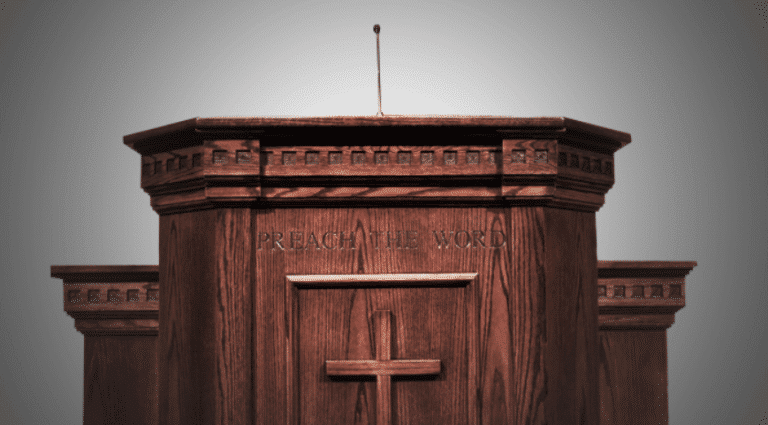I enjoy conferences for pastors and training workshops, and recommend them heartily. But I often return from them a little disturbed by the way expository preaching is viewed by some Christian leaders. According to them, expository preaching is the main ingredient for healthy Christianity, and the lack thereof is the reason for its sickness. If only, they say, all pastors were committed to expository preaching, the church would be reformed and revived.
I am committed to expository preaching. I have attempted it (however unsuccessfully) for over twenty years. We teach students in our seminary how to do expository preaching. I prefer to make the mainstay of my preaching expository series of books of the Bible. I believe expository preaching grows out of a conservative view of Scripture. If you believe that God has verbally inspired Scripture, making it the rule for all Christian life and practice, it follows that you submit to its meaning. Therefore, you desire to understand what has already been revealed, submit to it yourself, and make it plain to others. Expository preaching usually goes hand-in-glove with inerrancy, for when you believe the Bible has been given without error, you are fastidious in your approach to understand the very words of Scripture, not just the themes. Expository preaching also reveals a desire to preach the whole counsel of God, not our pet themes or popular topics.
But having said all that, I think many Christian leaders have a faith in expository preaching which is overblown and looks to expository preaching to do what it cannot accomplish by itself.
It is a tempting position to hold. After all, the Bible teaches us about worship. Surely if we preach expositionally, biblical worship will take place, right? The Bible speaks about what affections we should have for God. If we preach the whole counsel of God, won’t it automatically lead to ordinate affection?
Look around for the answer. You have any number of Reformed or conservative evangelicals who are committed to expository preaching, but who come out on almost opposite ends of the worship and affection spectrum.
This elephant-in-the-room fact leads many to relativize our applications of Scripture. If such good preachers who are so committed to biblical authority come out at completely different answers as to what it means to worship, it must be because we’re just talking about ‘styles’ and various ways of “contextualizing” the gospel. So as not to shake anyone’s faith in expository preaching as the be-all and end-all, the quite obvious disparity in worship and affections by those committed to expository preaching is played down in favor of a shared commitment to Reformed doctrine.
I think ignoring this disparity is part of the problem. It’s my contention that expository preaching is not a magic bullet, but it must be accompanied by something to have its desired effect.
The fact is, preaching occurs in a context. It ought to occur in the context of a local church. Within that local church, much of the meaning of expository preaching is fleshed out, specifically our worship-responses to God. In other words, the propositional truth of expository preaching must be modeled and incarnated in a church culture. You can hope that expository preaching will produce piety, devotion, and ordinate affection, but the truth is, propositional truth must be complemented by affective truth. Propositional truth tells us who God is; affective truth tells us what he deserves. Propositional truth tells us how Christians should respond to God; affective truth tells us what that looks like. Propositional truth gives it to us in black-and-white; affective truth colors it in for us.
The propositional truth of expository preaching must be modeled and incarnated in a church culture.
In other words, you can preach a sound and good sermon on Hebrews 12:28–29, but if you do not complement that exegesis with church worship that models reverence and awe, your expository preaching has not succeeded. If your church culture capitulates to a secular view of the affections, if it endorses a warped understanding of reverence and awe, you have done the truth equivalent of drawing a nice black and white outline of a sunset, and then coloring it in with green and brown.
We would like to think that expository preaching will produce biblical worship and ordinate affection, but it will not do so by itself for a simple reason: Scriptural truth is properly learned in the context of a right Christian culture. That culture, when handed down, is a tradition. Just as no one comes to the doctrine of the Trinity without inheriting that understanding from the church triumphant, so no one will understand “reverence and awe” without inheriting that understanding from the worship of the church triumphant. No one “thinks up” the hypostatic union by just doing sentence diagrams of John 1:1, and no one comes to a right understanding of “rejoice in the Lord” without seeing ordinate joy modeled by other believers. A right Christology is built on the shoulders of the church triumphant, and a right joy in Christ is built on the shoulders of the church triumphant. To argue that expository preaching is sufficient to right application is to ignore the relationship that Christian doctrine has always had with Christian practice, and therefore, Christian tradition. Right doctrine modifies and corrects the tradition. Tradition gives balance, context and correction to the doctrine. The two are simultaneous tools for Christian living.
Scriptural truth is properly learned in the context of a right Christian culture.
Tradition is not authoritative, Scripture is. But Scripture is interpreted with the help of the Spirit’s work in past believers as well as present ones. Whether we are talking about a right understanding of salvation by grace, or what it means to be of a contrite heart, we do not ignore what the church has said, sung, or prayed when we examine the Scriptures for ourselves. What is being done today to the tradition of worship in the West is the worship equivalent of rejecting all the doctrinal work done in Nicea, Constantinople, Chalcedon, Augsburg, Westminster, and New Hampshire, and re-formulating the doctrine of the Trinity from scratch, just to “contextualize it for moderns.” In fact, that’s exactly what some do. Sadly, many conservative evangelicals are guilty of the same deconstructionism in the area of worship.
All the more reason for Christian leaders to connect with our Christian heritage. If we do not understand what the church has meant by loving God, we will probably complement that propositional truth with an affective idea that is a sentimental, or brutal, or sensual, which will be idolatry. And worse, our people will be certain that their idolatry is pleasing to God, since it is done in a church committed to expository preaching.
Expositional preaching requires a living context to be understood. While the Holy Spirit is powerful enough to make the right applications to a completely blinded heart, he usually uses the natural means of family, church, and human culture to give a context to truth. Barring common grace, much in modern culture is useless for teaching the right application of Scripture. That leaves redeemed families and gospel churches to put flesh on the bones of expository sermons.
If we make the wrong applications in our own worship services, our devotion to expository preaching will be a tragic exercise of depending on one essential to provide all that is necessary for healthy Christianity.
If we make the wrong applications in our own worship services, our devotion to expository preaching will be a tragic exercise of depending on one essential to provide all that is necessary for healthy Christianity.




